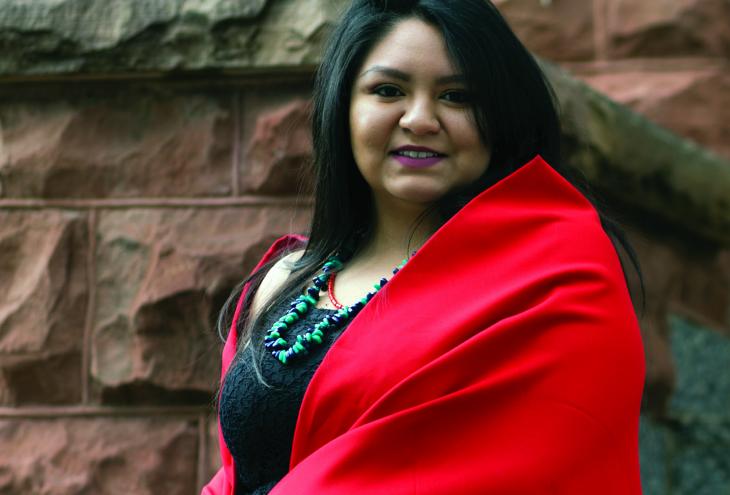Patricia Bancroft gives her family a huge part of the credit for her success. In her household there was no question — skip-ping college was just not an option. “I’ll be the second of three siblings to get an undergraduate degree,” says Bancroft, a member of the class of 2018 at Northern Arizona University. “I say it every day: my degree is not only for me but for my family.”
Her parents also helped her create goals and were her main supporters. “They’ve been there for me when I may have failed, were always there to help me up, and have seen me accomplish the goals I set,” she says. “My dad would tell me that he’s glad I’m able to set goals for myself because I have a path I could follow.”
In high school, Bancroft’s teachers at the Santa Fe Indian School in Santa Fe, N.M., helped her find her strengths in different subjects and encouraged her to explore. She discovered that she has a passion for science and for helping people. “Coming into college, I was set on the medical field,” says Bancroft, who majored in biology with a minor in chemistry. “But I knew that could change with experience and opportunity. And I knew biology would expand my options and allow me to explore other career fields.”
“I was active in AISES, the Miss Indian NAU Organization, and Abya Yala, a multicultural student association.... There are many resources to help students make connections on campus.”
Throughout high school and college, Bancroft has had various internships and jobs, from shadowing in a hospital and conducting research to being a summer school kindergarten instructor and interning with the U.S. Forest Service. “Each internship and job gave me the opportunity to explore,” she says. “Right now, I’d like to go into environmental science or environmental health because, whether or not we know it, the environment affects our health.”
When Bancroft was applying to college, she knew she wanted to be independent, but she didn’t want to go far away. “I wanted to be able to go home when I needed to or wanted to,” she explains. “Even so, I still did get homesick. The hardest times for me being in college out of state were when I had to tell my aunties that I wouldn’t be able to make it the weekend we had ceremonies and dances because I had an exam on Monday. Many times, it was hard when a family member passed away, and I would have to scramble to notify instructors and get all my work done.”
Because Bancroft was active in clubs and would hang out in the Native American Cultural Center, finding friends wasn’t hard. “I was active in AISES, the Miss Indian NAU Organization, and Abya Yala, a multicultural student association,” she says. “I also partnered with the Native American Cultural Center to demonstrate how to make Pueblo pies. There are many resources to help students make connections on campus.”
Bancroft also made an effort to find study buddies. “At first it was hard,” she says. “In every class, I would ask a classmate next to me if they’d like to study or do projects together. Eventually, I learned to join study groups.” She knows that many new college students find it difficult to balance their newfound independence with classes. She learned that it’s best to set a time to do homework for each class and schedule classes wisely. “Being able to plan and getting into the habit of studying have gotten me far,” she says. “Finding study groups, going to office hours, getting help from teaching assistants, and tutoring have helped me through many of my hard classes. Being able to accept that I needed help was a big step for me.”
Bancroft also ventured outside the sciences to take Indigenous studies courses, which motivated her to help all Native people. “Similarly, I’ve been involved in AISES since high school, and through AISES I’ve had the opportunity to network, meet people, travel, and learn about tribes that I had not known about,” she says. “It’s so important to have people who believe in you and want you to succeed.”













